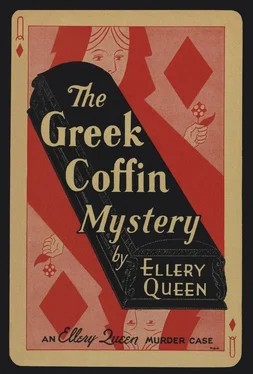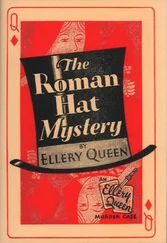“There are ways,” said the Inspector darkly.
“Rot, Q.,” snapped Sampson. “There’s not a shred of evidence against him. You can’t browbeat people like Sloane on mere suspicion because theoretically he had motive. What else, Pepper?”
“Well, Velie and I were sunk, and we knew it. We had no earthly right to keep the house segregated from the world, and Velie had to withdraw his two men yesterday. I didn’t feel like giving it up so easily, so I stayed overnight last night on a hunch — I don’t think most of ’em even knew I was there.”
“Catch anything?” asked Cronin curiously.
“Well.” Pepper hesitated. “I did see something... Not,” he continued hastily, “not that I think it means anything. She’s a swell kid — isn’t capable—”
“Who on earth are you talking about, Pepper?” demanded Sampson.
“Miss Brett. Joan Brett,” replied Pepper reluctantly. “I saw her snooping around Khalkis’ library at one o’clock this morning. She shouldn’t have been there, of course — Velie expressly told them all to keep out...”
“The charming amanuensis of our defunct mysterioso, I take it?” inquired Ellery lazily.
“Uh-huh. Well,” and Pepper seemed to have difficulty with his usually ready tongue, “well, she messed about the safe a bit—”
“Ha!” said the Inspector.
“... but I guess she didn’t find anything, because she sort of stood still in the center of the study for a moment, looking very pretty in a negligée, then she stamped her foot and beat it.”
“Did you question her?” asked Sampson querulously.
“No, I didn’t. You see, I don’t really think there’s anything wrong in that direction,” began Pepper, spreading his hands, when Sampson said dryly, “You’ll have to get over that predilection for pretty faces, Pepper. I’ll see that she’s questioned, and I’ll see that she talks, too, damn it all!”
“You’ll learn, Pepper,” chuckled Cronin. “I remember once when a dame threw her nice soft baby arms around my neck, and—”
Sampson frowned. Pepper started to say something, reddened behind the ears, and decided not to say anything after all.
“Anything else?”
“Just routine stuff. Cohalan’s still on duty at the Khalkis house, and so is Velie’s matron. They keep on searching every one that goes out of the house. Cohalan’s been keeping a list,” said Pepper, fumbling in his breastpocket, and producing a ragged slip of paper most unprofessionally scribbled over in smudgy pencil, “a list of every one from outside who’s visited the house since we left it Tuesday. Complete up to last night.”
Sampson snatched the scrap and read it aloud. “Reverend Elder. Mrs. Morse — that’s the old nut, isn’t it? James J. Knox — so he’s back. Clintock, Eilers, Jackson, the reporters. And who are these, Pepper? — these two people, Robert Petrie and Mrs. Duke?”
“Two wealthy old clients of the dead man. Called to pay their respects.”
Sampson crumpled the list absently. “Well, Pepper, it’s your funeral. When the call came in from Woodruff about the lost will you asked for the case and I gave you your chance. I don’t want to rub it in, but I’ll simply have to switch you if you let considerations like Miss Brett’s no doubt gorgeous map sway you from your duty... Well, enough of that. How does it line up to you? Any ideas?”
Pepper swallowed hard. “Don’t want to fall down... Well, one idea, Chief. Offhand, the facts make an utterly impossible case. The will must be in the house, and yet it isn’t. Poppycock!” He slapped Sampson’s desk. “Now there’s one fact that makes all the other facts look impossible. And that is — that Woodruff saw the will in the safe five minutes before the funeral. Well, sir — we’ve got only his word for that fact! You get what I mean.”
“You mean,” said the Inspector thoughtfully, “that Woodruff was lying when he said he saw the will at that time? In other words, that the will could have been stolen much before that five-minute period, and the person who stole it could have disposed of it outside the house at a time when his movements didn’t have to be accounted for?”
“That’s the ticket, Inspector. Listen — we have to go by logic, don’t we? The will didn’t disappear into thin air, did it?”
“How do you know,” objected Sampson, “that the will wasn’t taken out during that five-minute interval, as Woodruff said, and then burned, or was torn up or something?”
“But, Sampson,” said Ellery mildly, “you can’t very well burn or tear up a steel box, can you?”
“That’s right, too,” muttered the District Attorney. “Where on earth is that box?”
“That’s why I say,” said Pepper triumphantly, “that Woodruff’s lying. That will, and the steel box, too, never was in the safe when he said he saw it there!”
“But, heavens,” exclaimed the Inspector, “why? Why should he lie?”
Pepper shrugged. Ellery said with amusement, “Gentlemen, none of you is tackling this problem in the proper manner. This is just such a problem as must be analyzed, and every possibility taken into consideration.”
“You’ve analyzed it, I suppose?” said Sampson sourly.
“Ah — yes. Yes indeed. And my analysis leads to an interesting — I might say a very interesting — possibility.” Ellery sat up now, smiling. The Inspector took a pinch of snuff; he said nothing. Pepper leaned forward, all ears, regarding Ellery with a dawning personality, as if he had just noticed Ellery’s existence. “Let me go over the facts to date,” continued Ellery briskly. “You will agree that there are two supplementary possibilities: one, that the new will does not exist at this moment; two, that the new will does exist at this moment.
“Consider the first. If the will does not now exist, it means that Woodruff lied when he said he saw it in the safe five minutes before the funeral, that the will wasn’t there at that time, that the will had been previously destroyed by person or persons unknown. Or Woodruff told the truth, the will was stolen after he saw it, in that five-minute interval, and then destroyed. In this last event, it would have been possible for the thief to have burnt or torn up the will, disposing of the remains by slipping them down a bathroom drain, perhaps; but, as I pointed out an instant ago, the fact that the steel box has not turned up at all points to the improbability of this destruction theory. No remains of the steel box were found; then where is the steel box? Presumably taken away. If the steel box were taken away, then plausibly the will also was taken away, not destroyed. But, you say, under the circumstances, if Woodruff was telling the truth, the box couldn’t have been taken away. We have reached an impasse, therefore, in our first major possibility. In any event, if it is true that the will was destroyed, there is nothing further to be done.”
“And that,” said Sampson, turning to the Inspector, “that’s a help, that is. My God, man,” he said irascibly, swinging on Ellery, “we know all that. What are you getting at?”
“Inspector dear,” said Ellery mournfully to his father, “do you allow this man to insult your son? Look here, Sampson. You’re anticipating me, and that’s fatal to logic. Having thrown aside the first theory as so much tenuous vapor, we attack the alternative theory — that the will does exist at this moment. But what have we? — ah, a most fascinating state of affairs. Lend ear, gentlemen! Every one who left the house to attend the funeral returned to the house. The two people in the house remained in the house — one of them, Weekes, actually in the study, where the safe is, all the time. No one entered the house during the funeral. And at no time was there contact between the people of the house and the cortège with outsiders; for every one in the graveyard to whom the will might have been passed also returned to the house.
Читать дальше












